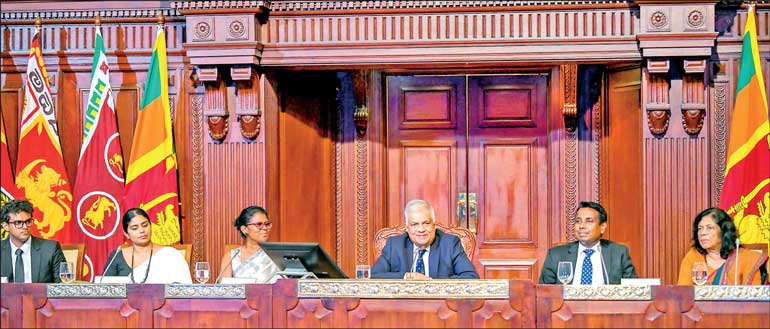Saturday Feb 21, 2026
Saturday Feb 21, 2026
Thursday, 30 May 2024 00:06 - - {{hitsCtrl.values.hits}}

President Ranil Wickremesinghe yesterday emphasised that none of the candidates aspiring to run in the presidential election have announced their intention to abolish the executive powers associated with the position.
He highlighted the dual nature of the executive presidential system, noting its advantages and disadvantages. He emphasised that the executive power vested in the Presidency played a pivotal role in the economic development of Sri Lanka and the resolution of the 30-year war.
The President made these remarks while participating in the “What’s New” dialogue on legal reforms with young legal professionals at a workshop held on Tuesday at the Presidential Secretariat.
Wickremesinghe emphasised the importance of enacting laws that render the President accountable to Parliament. He noted the decentralisation of certain executive powers to Provincial Councils and Parliamentary Oversight Committees, highlighting forthcoming divisions in this regard.
Moreover, Wickremesinghe affirmed the inevitability of future Presidential elections, stating that financial provisions for this purpose have already been allocated.
During his speech, Wickremesinghe also made the following observations.
“During President J.R. Jayewardene’s tenure as Executive President, significant strides were made for the country, marked by the implementation of major projects such as Mahaveli, Samanala wewa, and Lunugamvehera. Additionally, Kotte was elevated to the status of a capital city, and two trading zones were established. Notably, these developmental endeavours were executed amidst an eleven-year-long war.
Similarly, President Premadasa initiated the establishment of around 200 garment factories. The presence of the executive presidency was pivotal in Sri Lanka’s victory in the war, thwarting foreign hopes of inducing crisis and Government collapse. The ability to apply executive power, exemplified by President Mahinda Rajapaksa, facilitated the deployment of the military and eventual triumph in the conflict.
During the tenure of the good governance Government, there was a notable disconnect between the Executive President and the rest of the Government. The presence of executive powers was crucial in maintaining stability during the ‘Aragalaya’. This was evident when there was no clear successor for the premiership. On a particular occasion, when the President departed for Trincomalee, some individuals urged me to resign from my position as Prime Minister.
However, I asserted that I could only resign if there was a parliamentary majority, and even then, the resignation letter would need to be submitted to the President. Resigning under external pressure or due to personal reasons, such as threats to my residence, would risk the ascension of someone outside the democratic process to power.
In the future, we will hold the Presidential Election. None of the candidates vying for the position have announced plans to abolish its executive authority. It’s imperative that we develop a program geared towards reinforcing the parliament’s role and capabilities.”
Currently, some executive powers have been delegated to the Provincial Council, while others have been assigned to various commissions. Furthermore, Parliamentary oversight committees are operational. As more bills are introduced and debated in parliament, there will be a gradual shift of presidential powers to the Parliament, the legislative body.
Enacting laws that render the President accountable to Parliament is imperative. The Government’s agenda for the next four years should be outlined through the newly introduced Economic Transformation Act. Progress on implemented programs each year ought to be reported to Parliament annually. Karu Jayasuriya’s proposed Jana Sabha system appears highly feasible. Additionally, it’s worth noting the practicality of the forthcoming gender equality law.”